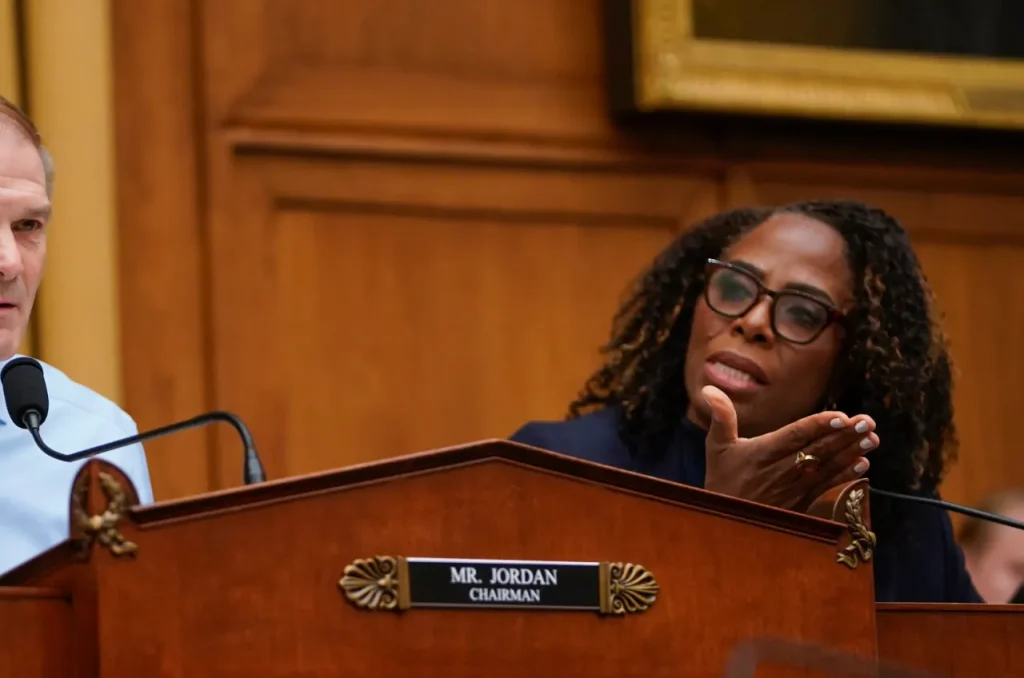The impassioned exchange on the House floor between Delegate Stacey Plaskett of the U.S. Virgin Islands and House officials regarding the non-voting status of territorial delegates during the Speaker election ignited a fierce debate about representation and the historical legacy of colonialism in the United States. Plaskett’s pointed questioning of the House clerk, followed by her declaration that the U.S. has a “colonies problem,” brought the long-simmering issue of disenfranchisement in the territories to the forefront, highlighting the complex relationship between these jurisdictions and the federal government. The incident laid bare the fundamental tension between the democratic ideals of the United States and the unequal political status of its territories.
Plaskett’s challenge to the established procedures of the House arose during the initial roll call vote for Speaker. Observing that she and other delegates from U.S. territories and the District of Columbia were excluded from the process, Plaskett raised a parliamentary inquiry, seeking clarification from the House clerk. She emphasized the significant population represented by these non-voting delegates – some four million American citizens – and highlighted their disproportionately high rate of military service. The clerk’s response, citing House rules that limit voting in Speaker elections to Representatives-elect, served as the catalyst for Plaskett’s subsequent, more forceful statement.
The delegate’s assertion that the U.S. has a “colonies problem,” delivered amidst a cacophony of shouts of “order” from Republicans and a standing ovation from some Democrats, directly challenged the historical narrative of American exceptionalism and brought the issue of territorial disenfranchisement into sharp relief. Plaskett’s remarks highlighted the inherent contradiction of a nation founded on principles of self-governance and representation denying full political rights to a substantial portion of its citizenry. Her statement exposed the raw nerve of a long-standing grievance within the territories, where residents are subject to federal laws and taxation but lack the same voting rights and representation as citizens residing in the states.
Plaskett’s argument centered on the idea that the non-voting status of territorial delegates, initially conceived as a temporary arrangement, has solidified into a permanent form of disenfranchisement. This “temporary” status, she argued, has perpetuated a system where residents of the territories are denied full participation in the democratic process, effectively treating them as second-class citizens. The ongoing exclusion from key legislative processes, including the Speaker election, underscores the power imbalance between the territories and the federal government, a dynamic reminiscent of colonial relationships. The implication is clear: the U.S., despite its democratic ideals, maintains a system that echoes its colonial past.
The mixed reaction to Plaskett’s statement, with Democrats applauding and Republicans booing, further illustrated the deep political divisions surrounding this issue. While some Democrats acknowledged the validity of her concerns about representation and equality, the Republican response reflected resistance to altering the existing power structure. This partisan divide underscores the difficulties in addressing the status of the territories and the complex legal and political considerations involved. The incident also revealed the broader debate within the U.S. about its role in the world and the legacy of its historical actions, particularly its past as a colonial power.
Plaskett’s protest during the Speaker election serves as a potent reminder of the ongoing struggle for full political rights and representation in the U.S. territories. Her evocative language, characterizing the situation as a “colonies problem,” directly challenges the conventional narrative of American democracy and forces a confrontation with the unresolved legacy of colonialism. The incident, while sparking controversy and highlighting partisan divisions, also reignited a critical conversation about the future of these territories and their relationship with the United States. The debate about full voting rights, equitable representation, and the very definition of what it means to be an American citizen is far from settled and will likely continue to resonate within the halls of Congress and beyond.

